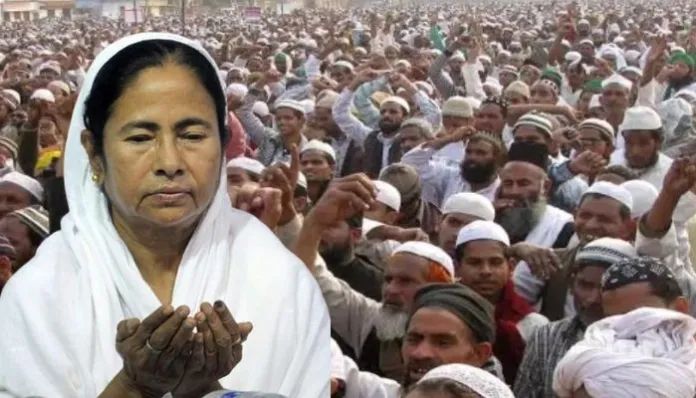West Bengal Chief Minister Mamata Banerjee recently made a bold claim in the state assembly, asserting that the Other Backward Classes (OBC) list in the state “is not based on religion.”
“A section is trying to campaign that our government is giving reservation based on religion. This is baseless… There is no question of making the OBC list on the basis of religion,” she stated while laying the annual report of the West Bengal Commission for Backward Classes (WBCBC) for the financial year 2024–25.
At first glance, this statement appears to uphold the constitutional principle that affirmative action must be based on social and educational backwardness — not religious identity. However, a closer scrutiny of the data provided by her own government betrays a very different story.
Not only does it exposes the hollowness of this claim, but it also raises serious concerns about misuse of the OBC category for blatant minority appeasement, in direct violation of judicial verdicts and the Constitution.
What the data actually shows
Let’s start with the numbers. Before 2010 — the year Mamata Banerjee’s Trinamool Congress rose to power — West Bengal had 66 OBC classes, of which 11 were Muslim and 55 were non-Muslim. That means Muslims accounted for only 20% of the total OBC categories at the time.
OBC = Other Backward Classes, but in West Bengal under Mamata Banerjee, it has become nothing more than a brazen attempt to appease Muslims, in gross violation of constitutional provisions.
Mamata claimed in the Assembly: “OBC list not based on religion.”
FACT CHECK: Her… pic.twitter.com/Y5Fun4XP4h
— Amit Malviya (@amitmalviya) June 11, 2025
Fast forward to 2025, and the picture has changed dramatically. The state government recently added 76 new classes to the OBC list.
These were split into two parts:
- Part 1: 51 new classes — 46 are Muslim (90%)
- Part 2: 25 new classes — 21 are Muslim (84%)


This clearly indicates that the additions were overwhelmingly skewed toward a single religious community — Muslims. Such a pattern can hardly be defended on solely socio-economic grounds, especially when it so disproportionately benefits one religious group over others.
OBC or religious appeasement?
When over 86% of new inclusions to the OBC list in West Bengal belong to one religious group, it no longer appears like a neutral effort at benefitting the socially backward. Instead, it resembles a systematic, state-sponsored attempt to include Muslims under the ambit of reservations in the guise of caste-based social justice.
The fact that this reclassification was followed up with a June 3, 2025 decision to increase OBC reservation in State Services from 7% to 17% only deepens suspicions. This hike inordinately benefits these newly included Muslim groups — effectively turning the OBC quota into a backdoor for religion-based reservation.
This is not just unconstitutional — it’s a deliberate manipulation, and perhaps a willful undermining of India’s reservations policy, to serve a political objective even if it comes at the cost of sabotaging the interests of OBC communities.
Mamata Banerjee insisted in the Assembly that these inclusions were “scientific” and “based on field surveys” carried out by the WBCBC. She added that the recommendations were made after a Supreme Court directive in December 2024 allowed the state three months to prepare a revised list, following a Calcutta High Court order that had previously struck down several OBC categories introduced since 2010 — including many of the same Muslim groups.
The CM claimed that the WBCBC proposed 140 communities (49 under OBC-A and 91 under OBC-B) based on “scientific surveys,” and that a survey of 50 more communities is underway. She also stated that all legal procedures were followed, including public notification and SC-mandated criteria. While such procedural compliance may appear reassuring, it does not explain the disproportionately high percentage of Muslim groups in the list — a figure that cannot be coincidental or purely data-driven.
In a state where Muslims make up roughly 27% of the population, this skew cannot be justified as a statistical coincidence. Instead, it appears to be a calculated political maneuver aimed at securing the Muslim vote ahead of the 2026 Assembly elections.
Judicial red flags ignored
The most glaring issue here is that both the Supreme Court and the Calcutta High Court have explicitly ruled against this very approach.
- On December 9, 2024, the Supreme Court reaffirmed that “reservation cannot be granted on the basis of religion.”
- Even before that, the Calcutta High Court struck down the previous iteration of the same OBC list, citing that it was religion-based and therefore invalid under constitutional norms.
Yet, the West Bengal government seems undeterred. By reintroducing a near-identical list of Muslim groups into the OBC category, the government has effectively shown contempt of court and undermined the very principle of secular, caste-based affirmative action. What’s unfolding is not an administrative error, but a calculated defiance of both constitutional morality and judicial authority.
An assault on social justice
OBC reservation exists to uplift those historically disadvantaged due to their caste, not to serve as a tool for political appeasement of any religious group and reinforce a loyal vote bank. By flooding the OBC list with Muslim groups under the garb of socio-economic backwardness — and then inflating the reservation ceiling — Mamata Banerjee’s government is diluting the purpose of caste-based affirmative action, sidelining genuinely backward Hindu, SC, and ST communities in the process.
If this trend continues unchecked, it sets a dangerous precedent where any political party can simply bypass constitutional checks, override court orders, and redefine social justice according to vote-bank priorities.
Mamata Banerjee’s claim that the OBC list is “not based on religion” is not only misleading — it is demonstrably false. Her own government’s data reveals a massive, deliberate skew toward including Muslim groups under the OBC umbrella, despite Supreme Court and Calcutta High Court rulings explicitly prohibiting such actions.
At its core, this episode is not about backwardness or social justice — it is about securing electoral gains at the expense of constitutional morality and judicial compliance. If this trend is allowed to continue, the very foundation of India’s reservations policy could be upended, and well, replaced — not by data or justice, but by political convenience.













